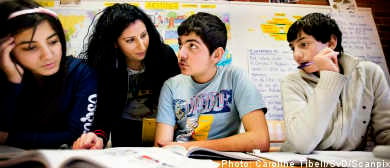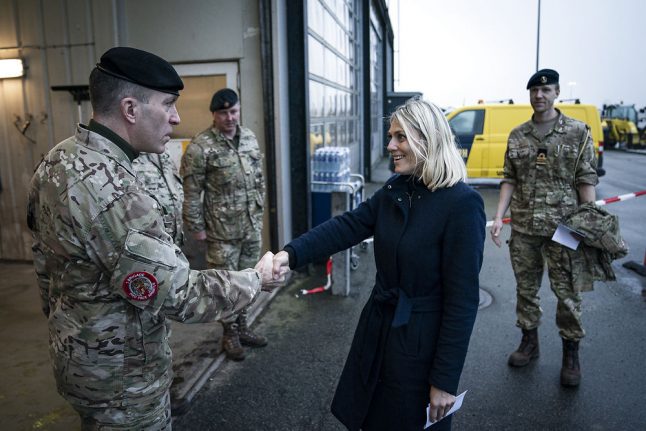As the children rush for the door at break-time at this small Swedish school, a few chatter eagerly in broken Swedish but most of the words shouted back and forth are Arabic.
The majority of the 16 children in this special transition class for newly arrived immigrants are Iraqi refugees who have fled with their families from the violence back home.
“To begin with it was hard. I didn’t know anything. But the other Iraqi students in class who arrived before me helped me out,” 13-year-old Rafi tells AFP.
But does he miss Iraq? “It’s better here,” he answers, energetically, imitating the sound of Baghdad’s all-too familiar bomb blasts.
“There were police outside our school,” he remembers.
His 14-year-old sister Sarah agrees it is nice not to worry when walking to school, but says she is sad to have left her cousins and dog behind.
Both children attend a “preparatory class” at the Ronna school, located in an immigrant neighbourhood of Södertälje, just south of Stockholm.
The special classes are aimed at making integration into Swedish society easier for recently arrived immigrant children, who after two years will be placed in “normal” Swedish classes.
There are currently some 100 newly-arrived Iraqi children attending the school out of a total of just 575 students.
Having left their shoes at the door, as is common in Sweden, Rafi, Sarah and the other children, wearing just socks or slippers, sit in small groups listening to teacher Gabriella Barson explain a text about culture shock.
The 11 Iraqi children and their five classmates from other countries, including Brazil, Russia and Germany, are eager to answer the teacher’s questions and the class soon erupts into joyous and rambunctious discussions.
“These students are very motivated,” says Barsom, a 27-year-old born to a Turkish mother and Syrian father.
Besides drilling in the school curriculum, the teachers’ main priority here is to make sure the children are well adjusted and feel safe.
“They have surely suffered a lot, but here we leave them alone and they have a chance to enjoy themselves,” school vice headmaster Lena Eriksson said, pointing out that a number of the Iraqi refugees at the school have been through traumatic experiences.
“The simple fact of going to a normal school is a type of therapy,” she
said.
Jan and Meriee, another Iraqi brother and sister, are trying to adapt to their new lives in Sweden after spending several years in Jordan after leaving their home country.
She dreams of becoming a lawyer while he wants to be a police officer.
Sweden feels safe, Jan says, pointing out that he had wanted to buy fireworks before New Years but had been turned away because he was too young.
“In Iraq, it’s no problem for anyone to buy weapons,” he says.
He fumbles for his words, but even though his friends offer to help translate from Arabic, he insists on expressing himself in heavily-accented Swedish.
The school regularly uses interpreters during lessons, and children struggling to express themselves are permitted to revert to Arabic in class.
One teacher, Sena Alkais, herself an Iraqi who arrived in Sweden six years ago, acknowledges that “I speak in Swedish but sometimes also in Arabic.”
In addition to making the children comfortable with the language the preparatory classes aim to introduce them to aspects of Swedish society they would likely miss if they never strayed from the immigrant-dense neighbourhood around the school.
Most of the students at Ronna are either immigrants themselves or born to one or two immigrant parents, most often from countries like Syria, Lebanon, Turkey and Iraq.
“Just about half of our work is to make it easy for them to go out and seek out this (Swedish) society,” explained Helena Söderblom, another teacher.
Each week the children go on field trips to places like the shopping centre or the train station and are given assignments like asking for directions in Swedish.
“Last week, a group of (Iraqi) boys decided they would just speak Swedish with each other. These kinds of initiatives are really wonderful,” says Söderblom.
Today, Rafi, Sarah, Jan, Meriee and their classmates are heading off to discover the Södertälje library.
“We work in a different way. It’s really fun,” Barson says.
AFP’s Sophie Mongalvy



 Please whitelist us to continue reading.
Please whitelist us to continue reading.